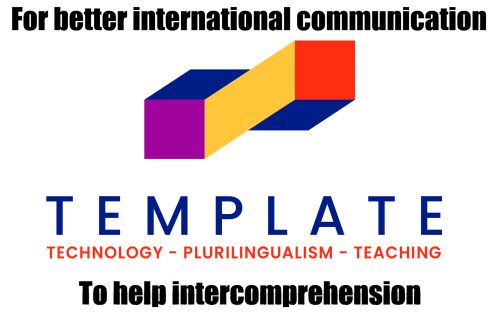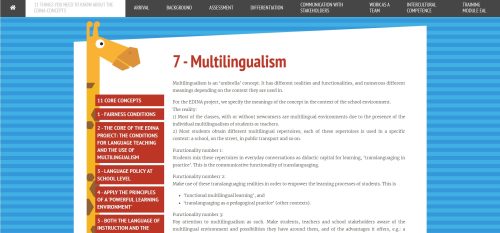Dates / Location
2023
Rotterdam (Netherlands) 
15 – 20 October
2024
Castelló de la Plana (Spain)
April 7 – 12
Louvain La Neuve (Belgium)
November 10 – 15
Target Groups
- teachers interested in subject teaching in which all pupils, regardless of their language background, can participate through a targeted focus on (subject specific) language and language development
- teachers involved in MFL teaching, CLIL activities and project-based learning
Course Aims
This course aims to:
- familiarise teachers with didactic approaches that make use of the home languages (“heritage languages”) of students
- promote teacher professionalism in applying inclusive strategies that teachers can use to engage all students in multilingual classes
- professionalise MFL & CLIL teachers in adapting and designing technology-enhanced activities and language teaching in specific contexts (CLIL, Virtual Exchange) for the multilingual classroom
- promote exchange of good practices through EDINA & TEMPLATE’s and related projects padlet resource pages
- empower teachers to apply subject language scaffolding strategies and related use of technology
- develop participants’ skills related to adapting and designing tasks and scaffolding (digital) materials.
Methodology:
The course combines plenary, tutor-led introductions & viewing videos of exemplary classroom procedures with follow-up activities when participants do practical work individually, in pairs and small groups applying the concepts and principles presented by analyzing and discussing viewed practices, and/or practicing approaches involving specific technologies or applications.
To address the anticipated variety in participants’ interests and needs (in terms of target groups and individual skills levels) most tasks are designed to accommodate differentiated relevant learning experiences and outcomes.
At the end of the week delegates will demo, share and discuss a teaching unit created during the hands-on sessions.
To provide flexible access to course related tasks and resources a course learning management system (LMS) will be used. After the course concludes, participants will be able to access the LMS to promote follow-up communication and collaborative learning.
Preparation:
A pre-course, online questionnaire could be provided to assess pre-knowledge and further align course content and procedures to needs and (specific) interests.
Delegates are requested to bring subject book(s) and/or related ICT materials (if available) to be used when creating customised materials and activities.
Day-to-day Programme Topics 
Day 1
- Meet & Greet / Introductions
- Questionnaire review / finetuning expectations
- Cultural Event
Day 2
- Overview of course and course structure in the Learning Management System (LMS)
- Exploring and aligning participants’ understanding of the concepts ‘heritage language’, language awareness and pedagogical translanguaging.
- Reflection on own current practice
- Introduction to EDINA & TEMPLATE sample activity materials
- Analysing research results on how a multilingual approach benefits multilingual classrooms
- Tips for planning using the home languages in the classroom
- Exploring methods to employ multilingualism as a resource, without losing native speakers of the school language
Day 3
- Introduction to the key models and approaches in the EDINA & TEMPLATE projects.
- Exploring and aligning participants’ understanding of the concepts ‘Task Based Language Learning’ (TBLT) and ‘Technology enhanced TBLT’
- Analysing sample practices
- Reflection on own current practice
- Feed up on the course task: (re)design a Technology enhanced task based language learning activity (selecting textbook topic / unit in current practice for elaboration)
Day 3
- Introduction to pluringual approaches to teaching and learning in CLIL contexts
- Exploring TEMPLATE’s sample activity materials for CLIL lessons
- Exploring techtools to support the implementation of plurilingual CLIL lessons
- Developing the first draft of your lesson plan
Day 4
- Introduction to pluringual approaches to project-based learning and Telecollaboration
- Exploring TEMPLATE’s sample activity materials for telecollaborative teaching learning
- Exploring techtools to support the implementation of plurilingual Telecollaboration
- Developing materials for your lesson plan
Day 5
- Focus on exchange of good practices: use of padlets
- Exploring the TEMPLATE’s Padlet and its references to resources developed by related projects
- Experiencing games designed for the plurilingual classroom.
- Developing the contents and tech-related materials for your lesson plan
Day 6
- Finalising designing lesson activities
- Lesson demo, sharing and discussing materials created by participants
- Suggestions for sharing insights with school colleagues and further continuing professional development activities
- Course wrap-up, evaluation and certification
Click here for the General TELLConsult Course Terms (registration, procedures, costs, cancellation, etc…)